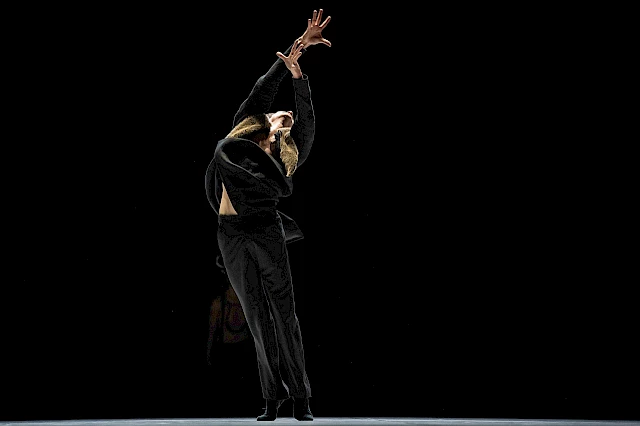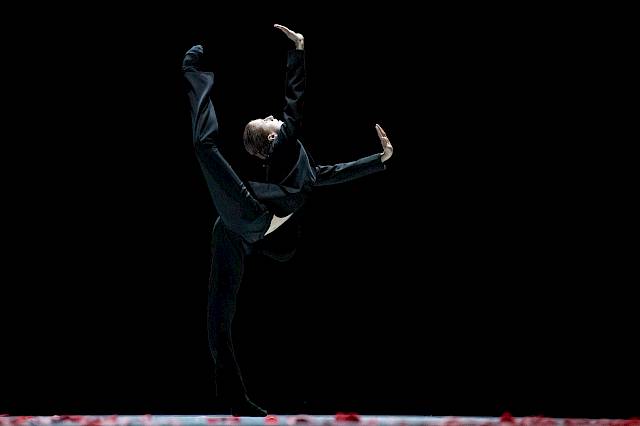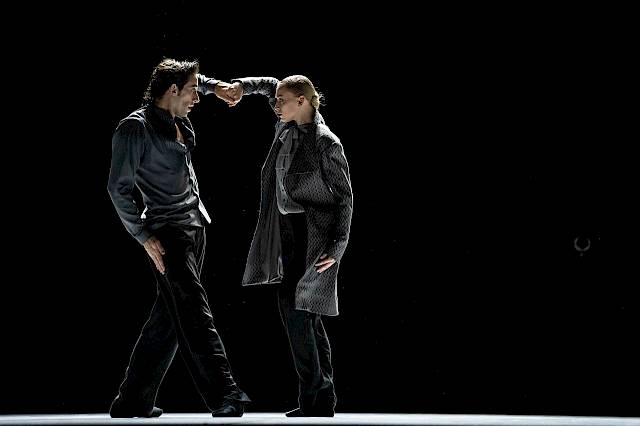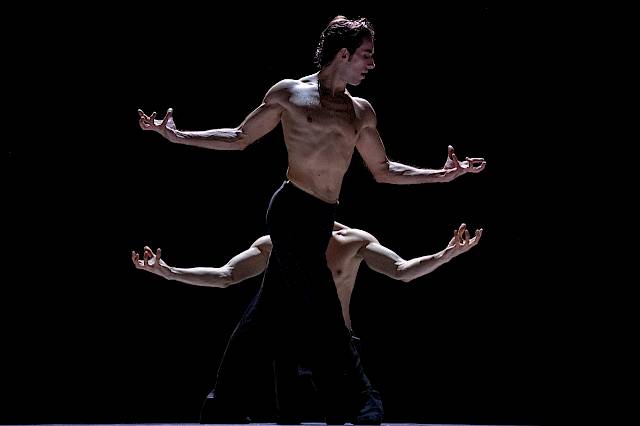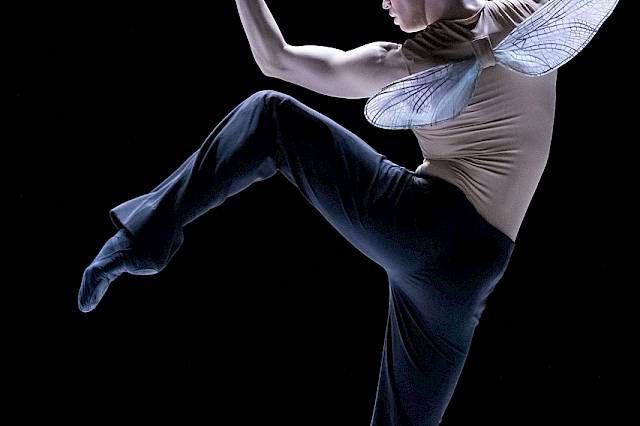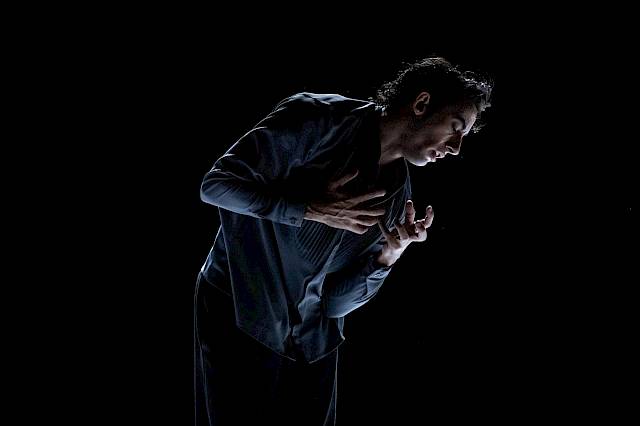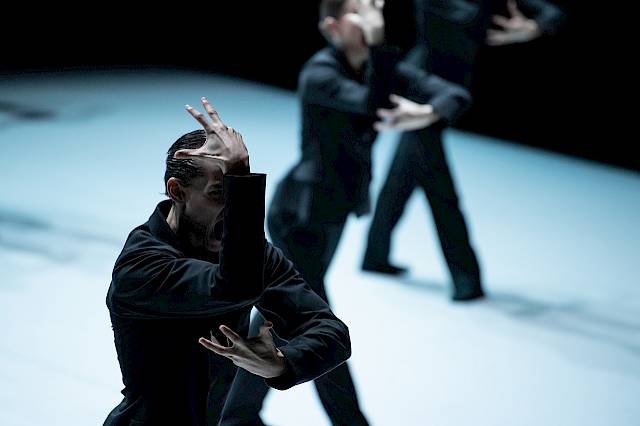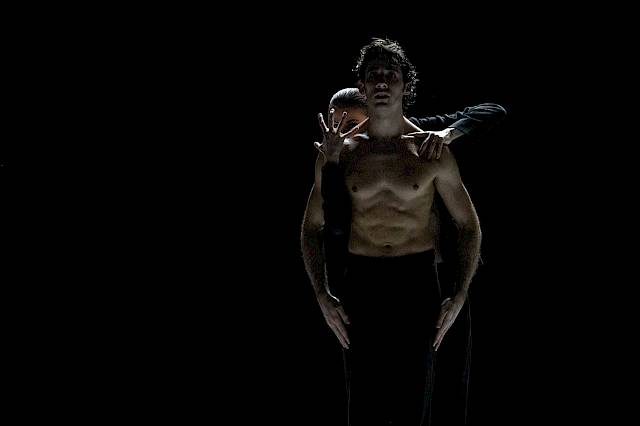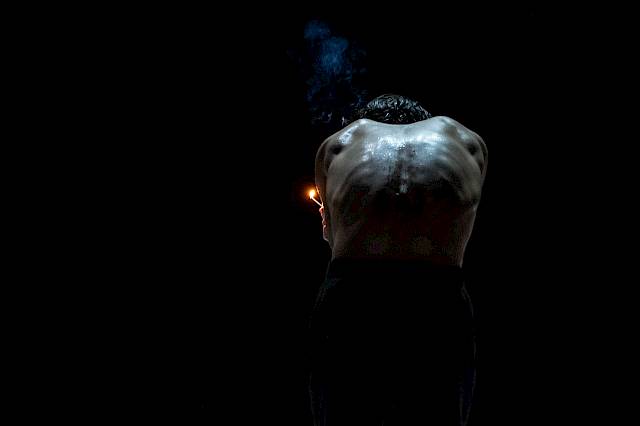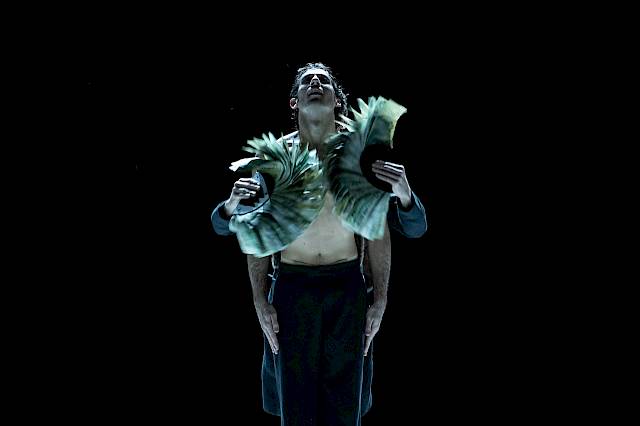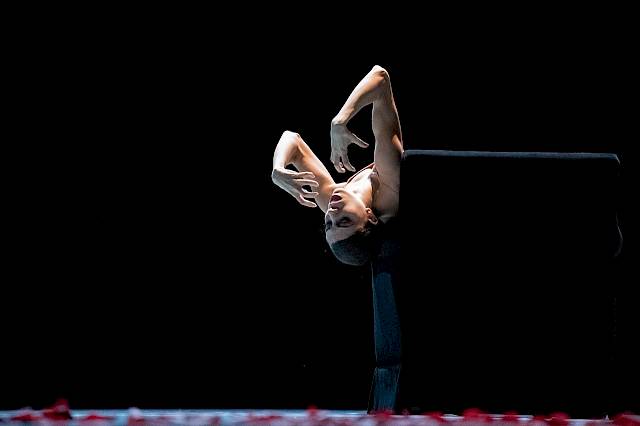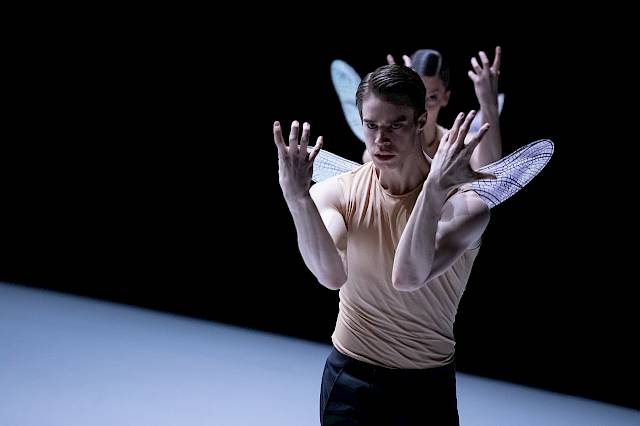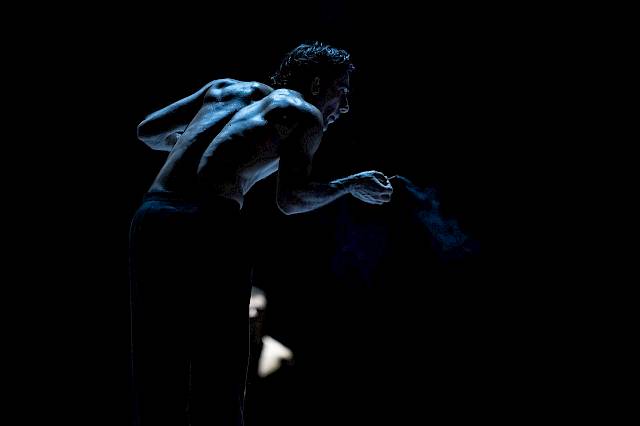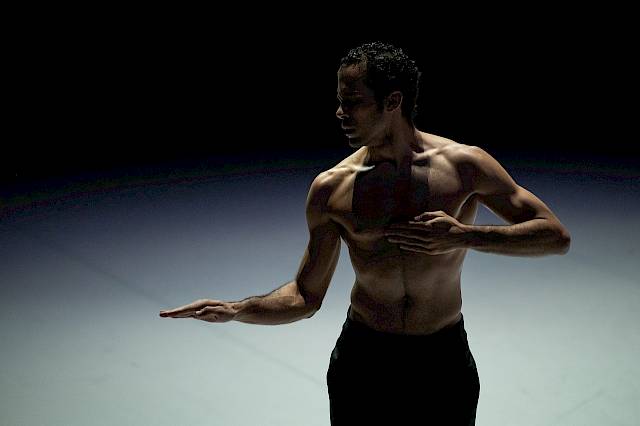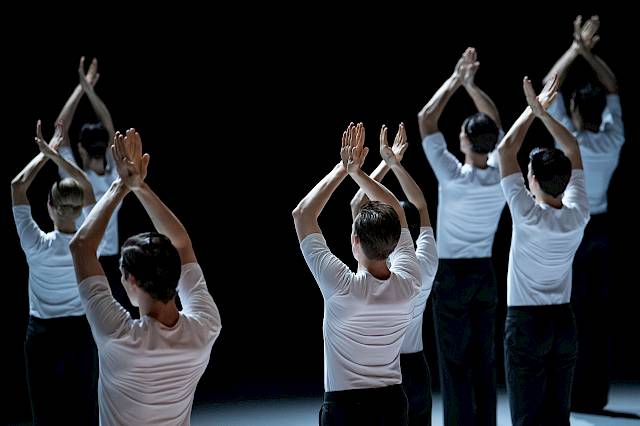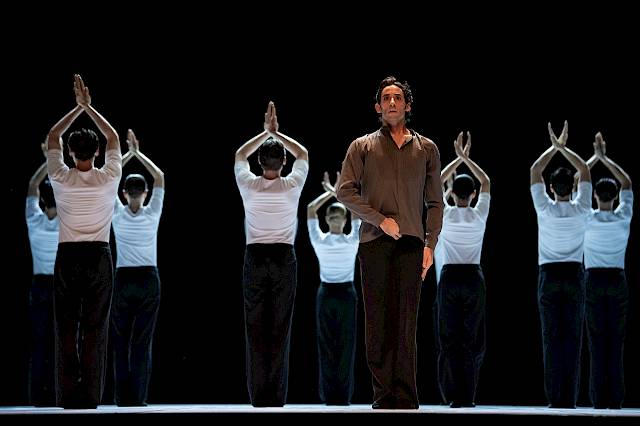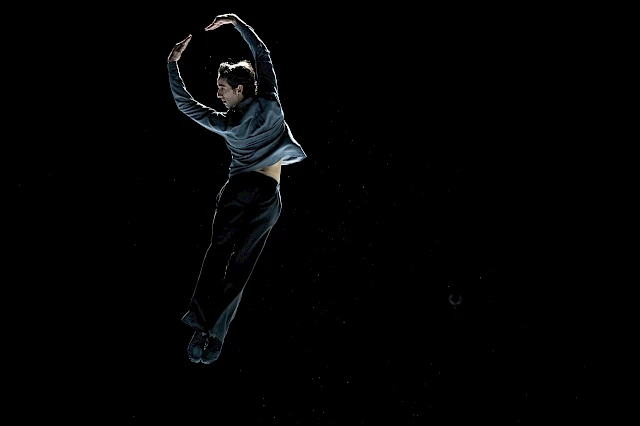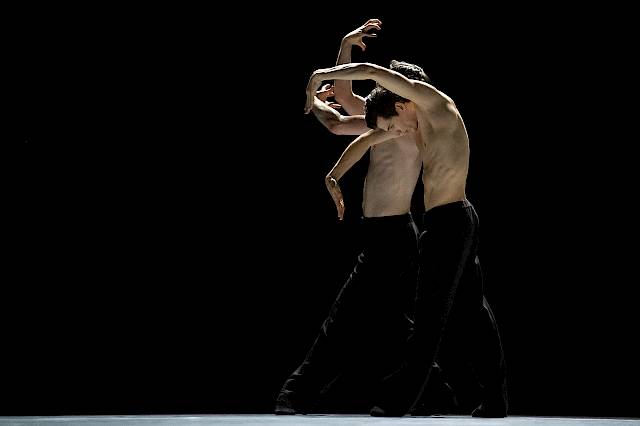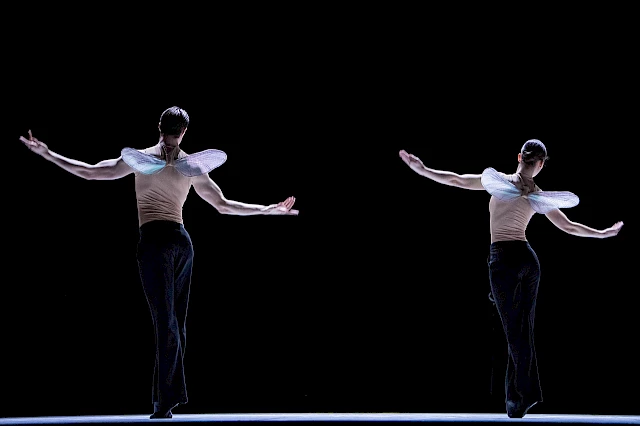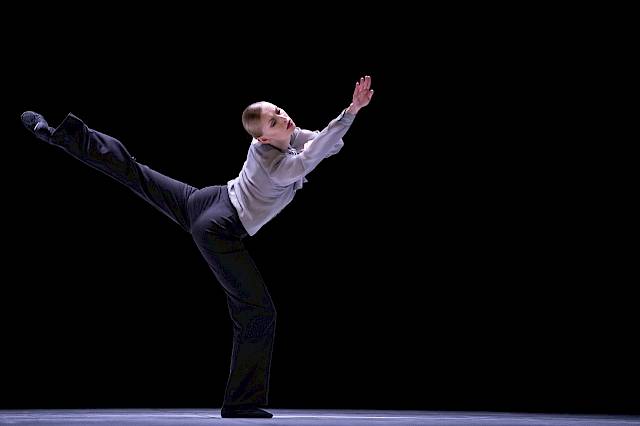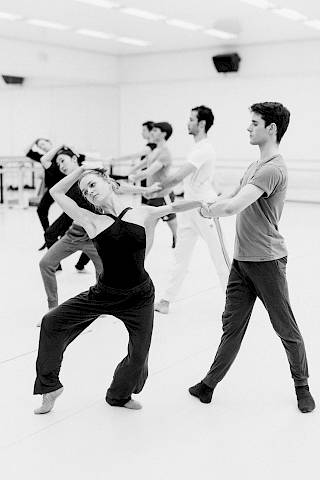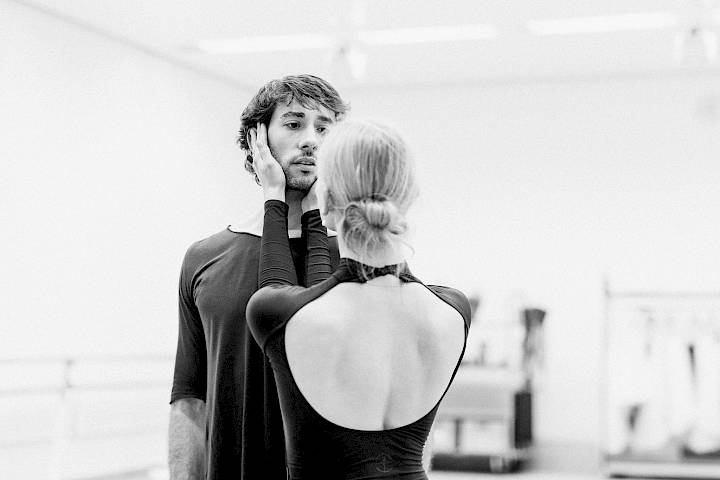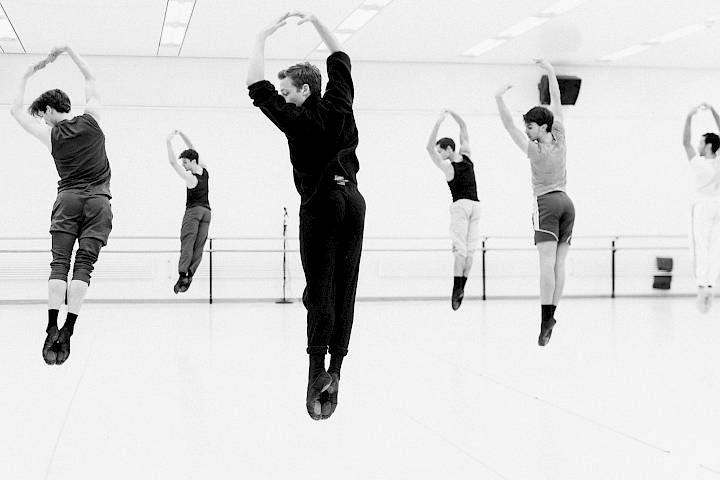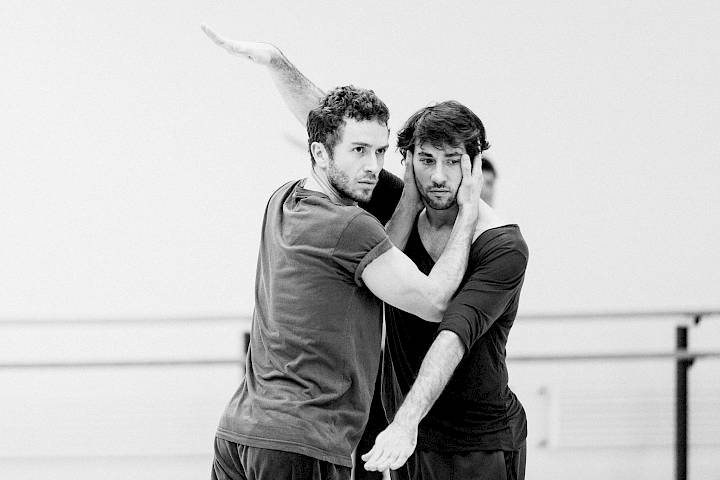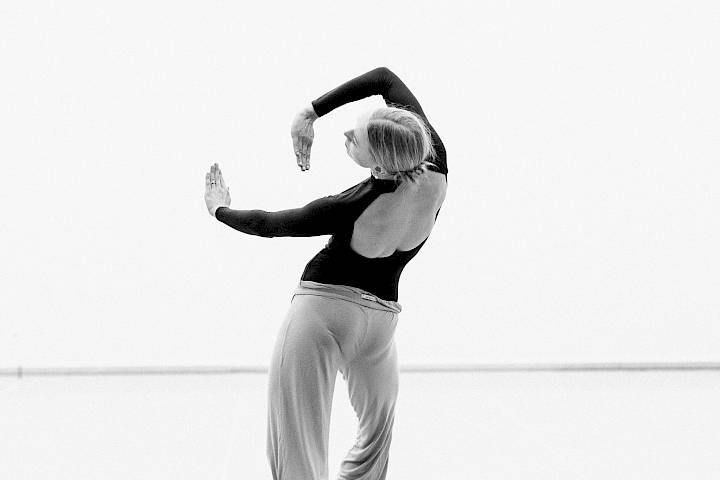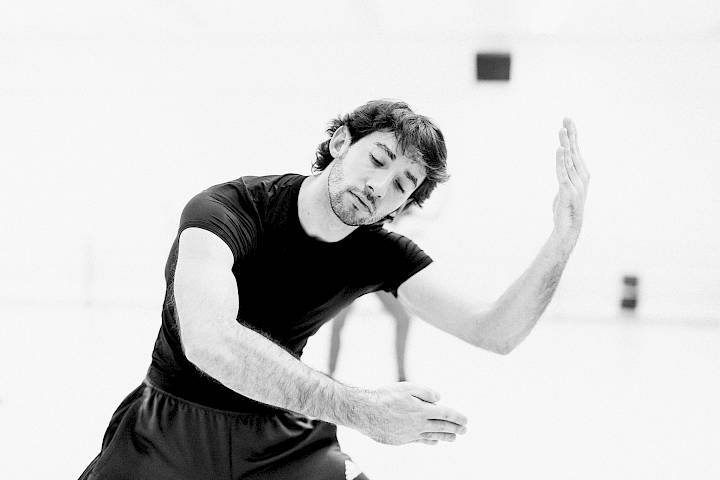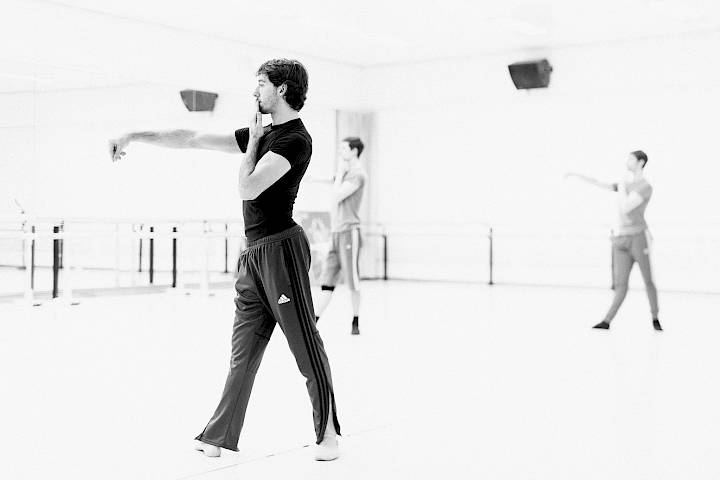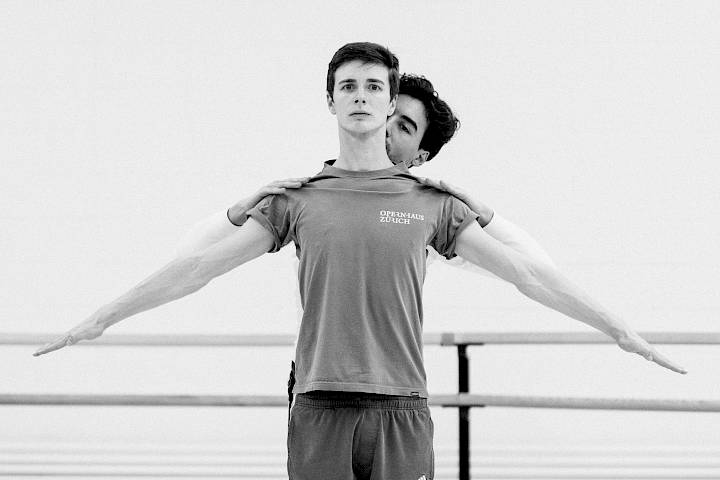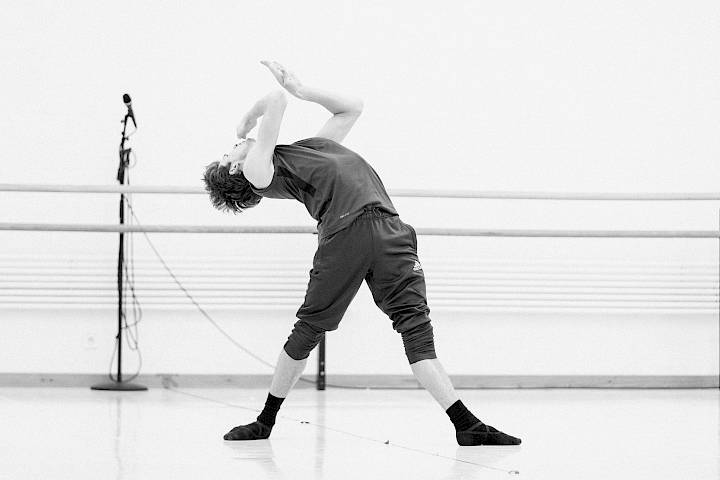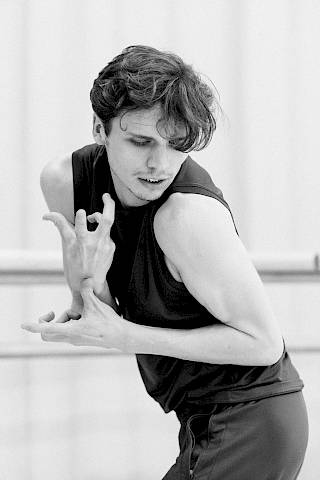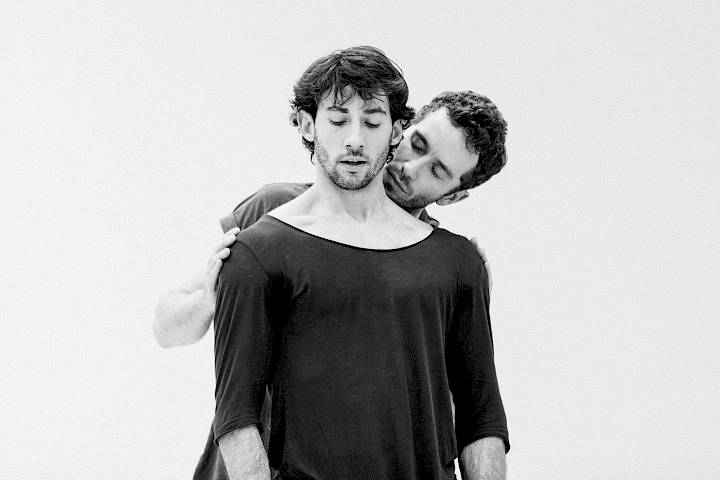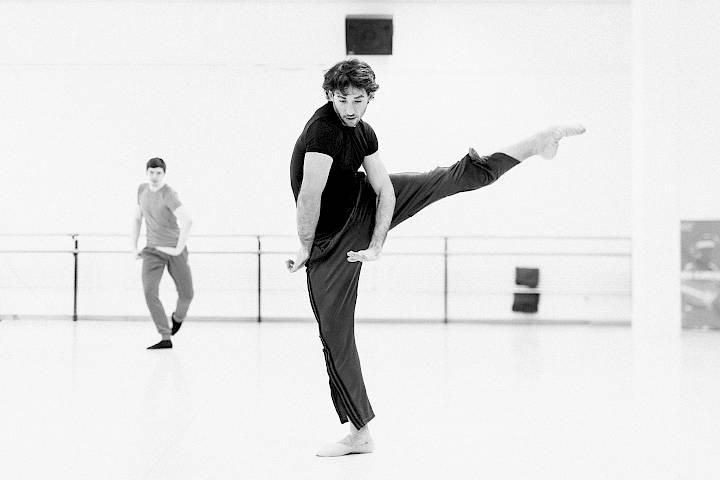Nijinski
Ballet by Marco Goecke
Music by Frédéric Chopin and Claude Debussy
Revised Zurich version (2019)
Duration 1 H. 30 Min. Without intermission. Introduction 45 min before the performance.
Past performances
March 2019
April 2019
Good to know
Nijinski
Abstract
Nijinski
Only ten glorious years were granted Vaslav Nijinsky at the head of Sergei Diaghilev’s legendary Ballets Russes. He intoxicated audiences – with virtuoso leaps and androgynous charisma – as the Faun and the Golden Slave. His audacious choreographies provoked scandals. He loved a man and married a woman. The dancer fell at the pinnacle of his fame. Before he died in London in 1950, he had spent thirty deranged years in the shadows of mental asylums. Compulsory admission to a psychiatric clinic, dubious diagnoses and experimental therapies drove his soul beyond the reach of others.
Marco Goecke has dedicated a feature-length ballet to this epoch-making dancer and choreographer. The result fascinatingly merges Goecke’s distinctive, nervously trembling, frantic body language with reminiscences of Nijinsky the artist. This also allows for choreographic elements of his career as a dancer to be incorporated. The choreography focuses on Nijinsky the man and his character, transposing emotions into highly aesthetic movement. Although Marco Goecke accompanies the exceptional artist through the stages of his life, the piece extends far beyond a purely biographical study, and focuses on fundamental questions. The magic and value of art takes centre stage – but also the price that it intransigently exacts from all creative people.
After Deer Vision and Petrushka, Marco Goecke will once again be a guest of Ballett Zürich to develop a new, extended version of his Nijinski ballet with the ensemble. The original was premièred at the Theaterhaus Stuttgart’s Gauthier Dance festival to great acclaim.
Together with Claude Debussy’s Prélude à l’après-midi d’un faune, Frédéric Chopin’s two piano concertos – played by the Swiss pianist Adrian Oetiker – will form the musical framework of this moving evening. Pavel Baleff will conduct the Philharmonia Zurich.
Nijinski
Synopsis
Nijinski
Erstes Bild
Die Macht der Kunst
Bedrohlich und doch verheissungsvoll scheint die Welt der Kunst zu beben.
Ein Tänzer auf der Suche nach seinem künstlerischen Ich. Die Ahnung von etwas Neuem zeichnet sich am Horizont ab.
Zweites Bild
Terpsichore
Terpsichore, die göttliche Muse des Tanzes, erscheint und verschenkt ihre Inspiration.
Drittes Bild
Diaghilew
Diaghilew, der geniale Impresario und Kunstkenner, fühlt sich berufen, die russische Kunst bekanntzumachen. Terpsichore haucht auch ihm ihren göttlichen Funken ein. Doch die Ahnung von Ruhm weckt auch Diaghilews Gier.
Viertes Bild
Nijinski
Vaslav Nijinski wächst heran und wird Teil der Ballettwelt.
Sein Talent ist unübersehbar. Er lebt mit seiner Mutter zusammen.
Fünftes Bild
Matka
Matka, seine polnische Mutter, umsorgt Nijinski und fördert sein Talent.
Als er an der Kaiserlichen Ballett-Akademie in St. Petersburg aufgenommen wird, nehmen die beiden Abschied.
Sechstes Bild
Erwachen
Nijinskis Kreativität bricht hervor. Rollen, die er in Zukunft tanzen wird und die seinen Namen unsterblich machen werden, blitzen auf.
Sein sexuelles Begehren erwacht.
Siebtes Bild
Les Ballets russes
Unter Diaghilews Leitung formieren sich die Ballets russes.
Zwischen Nijinski und Diaghilew entsteht eine Hassliebe.
In einem erotischen Traum begegnet Nijinski seinem Freund Isajef.
Der Traum endet im Tanz – und in der Kunstfigur des triebhaften Fauns.
Achtes Bild
Ruhm
Nijinski ist auf der Höhe seines Ruhms und verkörpert seine berühmtesten Partien: Petruschka, den Faun und den Geist der Rose.
Er begegnet Romola, seiner zukünftigen Frau.
Neuntes Bild
Das Wesen der Verdunklung
Es kommt zum Bruch von Diaghilew und Nijinski. Das Wesen der Verdunklung senkt sich über Nijinskis Gemüt und treibt ihn in die Isolation. Wahnsinn gewinnt die Macht über seinen Geist. Immer wieder kommt es zu unkontrollierten Wutausbrüchen.
Zehntes Bild
Kreise
Das Zeichnen unzähliger Kreise lindert Nijinskis Verwirrung.
Die hochkomplexen, aber auch wilden Zeichnungen sind alles, was von seinem kreativen Leben übrig ist.
Biographies
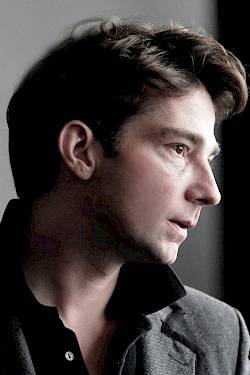
Marco Goecke,
Marco Goecke
Marco Goecke stammt aus Wuppertal. Seine Ballettausbildung absolvierte er an der Ballettakademie der Heinz-Bosl-Stiftung München sowie am Königlichen Konservatorium Den Haag. Darauf folgten Engagements an der Staatsoper Berlin und am Theater Hagen. An diesem Theater schuf Goecke im Jahr 2000 seine erste Choreografie mit dem Titel Loch. Es folgten mehrere Choreografien für die Noverre-Gesellschaft mit Tänzern des Stuttgarter Balletts und eine Einladung an das New York Choreographic Institute. Mit der Spielzeit 2005/06 wurde Marco Goecke zum Hauschoreografen des Stuttgarter Balletts ernannt und kreierte dort 2006 sein erstes Handlungsballett Nussknacker, das später auch für den ZDF-Theaterkanal verfilmt wurde. Von 2006 bis 2012 hatte Goecke den Titel des Hauschoreografen auch beim Scapino Ballet Rotterdam inne. Ab der Spielzeit 2013/14 wurde er Associate Choreographer beim Nederlands Dans Theater. 2019 bis 2023 war er Gauthier Dance als «Artist in Residence» verbunden, von 2019 bis 2023 war er Ballettdirektor des Staatsballetts Hannover. Von den über neunzig Werken, die Goecke innerhalb von wenigen Jahren geschaffen hat, gehören viele zum Repertoire namhafter Ballettcompagnien, u. a. Grands Ballets Canadiens de Montréal, Canadian National Ballet, Ballett-Theater München, Finnish National Ballet, Ballett Zürich, Ballett am Rhein Düsseldorf, Ballett der Opéra de Paris und Ballett der Wiener Staatsoper. Marco Goecke wurde mit zahlreichen Preisen ausgezeichnet, darunter der Nijinsky Award Monte Carlo, der Niederländische Tanzpreis «Zwaan» sowie der italienische «Danzadanza Award» für Nijinski als «Beste Choreografie des Jahres». In der Kritikerumfrage der Zeitschrift tanz wurde er 2015 als «Choreograf des Jahres» ausgezeichnet. Das vom NDT uraufgeführte Stück Wir sagen uns Dunkles wurde für den Prix Benois nominiert. 2022 wurde Marco Goecke mit dem Jiří-Kylián-Ring sowie dem Deutschen Tanzpreis ausgezeichnet. Zu seinen jüngsten Arbeiten gehören das abendfüllende Stück A Wilde Story über den Schriftsteller Oscar Wilde für das Staatsballett Hannover sowie das 2023 entstandene Stück In The Dutch Mountains für das Nederlands Dans Theater. Mit der
Spielzeit 2025/26 wird Marco Goecke Direktor des Balletts am Theater Basel.
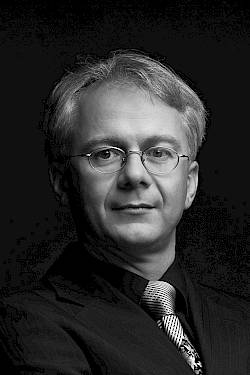
Pavel Baleff,
Pavel Baleff
Pavel Baleff ist Chefdirigent der Philharmonie Baden-Baden. Engagements als Opern- und Konzertdirigent führten ihn u.a. an das Zürcher Opernhaus, die Dresdner Semperoper, das Leipziger Gewandhaus, die Hamburgische Staatsoper, das Bolschoi Theater Moskau, die Oper Montpellier, zum Dänischen Nationalorchester, zum Mozarteum Orchester Salzburg sowie zu den Rundfunksinfonieorchestern des WDR und des BR. Er leitete Aufführungen, Fernsehaufzeichnungen und CD-Produktionen mit international renommierten Solisten wie Krassimira Stoyanova, Diana Damrau, Edita Gruberova und Vesselina Kasarova, Ramón Vargas, Anne-Sophie Mutter, Anna Netrebko, Thomas Hampson, Piotr Beczala und Luca Pisaroni. Seine CD-Produktionen mit der Sopranistin Krassimira Stoyanova und dem Münchner Rundfunkorchester wurden 2012 und 2014 mit dem Jahrespreis der Deutschen Schallplattenkritik und dem International Classic Music Award prämiert. Anlässlich der von ihm geleiteten Ersteinstudierung des Ring des Nibelungen in Bulgarien an der Nationaloper in Sofia wurde er zum bulgarischen «Dirigenten des Jahres» gewählt. 2016 debütierte er an der Wiener Staatsoper mit L’elisir d’amore und 2017 an der Staatsoper Stuttgart mit Romeo und Julia. Am Opernhaus Zürich dirigierte er in jüngster Zeit Schwanensee sowie die beiden Opern von Ravel L’Heure Espagnole und L’Enfant et les sortilèges. Pavel Baleff ist 1. Preisträger beim Carl-Maria-von-Weber-Wettbewerb in München sowie beim Internationalen Bad Homburger Dirigentenwettbewerb, wurde in das Dirigentenforum des Deutschen Musikrates aufgenommen und erhielt eine Auszeichnung durch die Herbert von Karajan Stiftung.
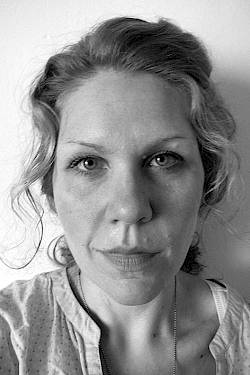
Michaela Springer,
Michaela Springer
Michaela Springer studierte Bühnen- und Kostümbild an der Staatlichen Akademie der Bildenden Künste Stuttgart bei Martin Zehetgruber. Vor und während ihres Studiums arbeitete sie als Assistentin am Schauspiel Stuttgart und am Aalto Theater Essen. Seit 2005 ist sie als freischaffende Bühnen- und Kostümbildnerin für Schauspiel, Oper und Ballett tätig und entwarf in Deutschland u.a. die Ausstattung für Produktionen an der Württembergischen Landesbühne Esslingen, am Düsseldorfer Schauspielhaus, am Hessischen Staatstheater Wiesbaden, Schauspielhaus Dortmund, Schlosstheater Moers und am Rheinischen Landestheater Neuss. Mit dem Choreografen Marco Goecke arbeitete Michaela Springer erstmals 2005 zusammen und entwarf die Kostüme für sein Ballett Sweet Sweet Sweet. Es folgten Ausstattungen beim Stuttgarter Ballett für Der Nussknacker (2006), Alben (2008), Orlando (2010), Black Breath (2012) On Velvet (2013) und Lucid Dream (2015). Die erfolgreiche Zusammenarbeit setzte sich auch bei Auftragswerken für das Scapino Ballett Rotterdam mit Der Rest ist Schweigen (2005), Bravo Charlie (2007) und Songs for Drella (2011), für Les Ballets de Monte-Carlo mit den Stücken Whiteout (2008) und Le Spectre de la Rose (2009) fort, für das Ballett Zürich mit dem Stück Deer Vision (2014)wie auch bei dem Ballett Fur (2009) für das Norwegische Nationalballett. Michaela Springer entwarf ausserdem die Kostüme zu zwei Balletten des Choreografen Demis Volpi.
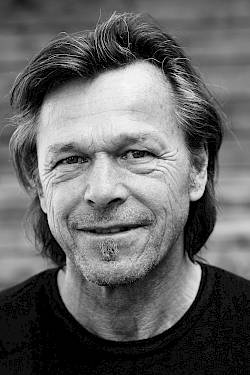
Udo Haberland,
Udo Haberland
Udo Haberland war zunächst Fotograf in Berlin. 1988 begann er, für Film und Fernsehen sowie für die Staatsoper Stuttgart zu arbeiten. Als freier Lichtgestalter und Beleuchtungsmeister für Ballett, Tanz, Oper und Schauspiel arbeitete er in Europa, den USA und Australien, u.a. für die Salzburger Festspiele, die Wiener Festwochen und die Ludwigsburger Festspiele. Im kommerziellen Bereich war er u.a. für Arte, MTV & VIVA, ARD, ZDF, Deutsche Telekom, Daimler-Crysler, Toyota, Kodak tätig. Seit 2003 verbindet ihn eine enge Zusammenarbeit mit dem Choreografen Marco Goecke. Udo Haberland war Lichtdesigner bei sämtlichen Goecke-Kreationen für das Stuttgarter Ballett. Daneben entstanden gemeinsame Produktionen für das Scapino Ballett Rotterdam, das Nederlands Dans Theater, Les Ballets de Monte-Carlo, die São Paulo Companhia de Dança, das Staatsballett Berlin, das Norwegische Nationalballett, das Ballett am Rhein, das Ballett des Theaters am Gärtnerplatz und das Ballett der Opéra de Paris. Ausserdem arbeitet Udo Haberland mit den Choreografen Cayetano Soto, Örjan Andersson, Bridget Breiner, Jérôme Delbey und Giovanni Di Palma zusammen.
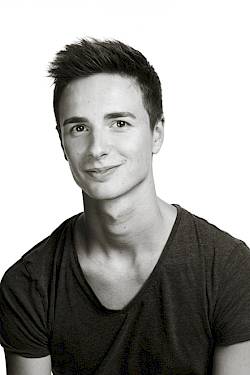
Jan Casier,
Jan Casier
Jan Casier was born in Belgium. He studied at the Royal Ballet School in Antwerp. From 2008 to 2012 he was a member of the Royal Ballet of Flanders where he danced in ballets by John Cranko, William Forsythe, David Dawson and Christian Spuck. He appeared in David Dawson’s Faun(e) as a guest at the English National Ballet. From 2012 to 2014 he was a member of Ballett Zürich, where he performed roles in numerous Christian Spuck ballets, including Leonce in Leonce und Lena, Paris in Romeo und Julia and the title role of Woyzeck. He also danced in choreographies by Edward Clug, Sol León/Paul Lightfoot, Marco Goecke and Wayne McGregor. From 2014 to 2016 he was a member of the Semperoper Ballett Dresden. There he performed in choreographies by Aaron Watkins (Prince in The Nutcracker), William Forsythe, Alexei Ratmansky, David Dawson and Alexander Ekman. Jan Casier returned to Ballett Zürich in 2016. Since his return, he has danced in Forsythe’s Quintett, Godani’s rituals from another when and the title role in Edward Clug’s Faust and Marco Goecke’s Nijinski. He also appeared as Drosselmeier in Christian Spuck’s Nussknacker und Mausekönig. In 2019, he was named «Dancer of the Year» by the «tanz» magazine and was awarded the «Tanzpreis der Freunde des Balletts Zürich».
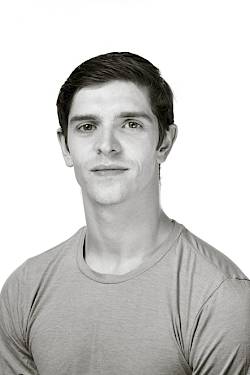
Matthew Knight,
Matthew Knight
Matthew Knight is British. He completed his training at the Elmhurst School and the Royal Ballet School in London. After a season with the Junior Ballett, he joined Ballett Zürich in the 2014/15 season. He presented Jane Doe and Mocambo as part of the «Junge Choreografen» series. He has danced in choreographies by Mats Ek (Cavalier in Dornröschen), William Forsythe, Marco Goecke (Moor in Petruschka), Jiří Kylián, Douglas Lee, Sol León/Paul Lightfoot, Hans van Manen, Wayne McGregor, Ohad Naharin, Crystal Pite, and Filipe Portugal. He was Leonce in Christian Spuck’s Leonce und Lena, Nathanael in Spuck’s Der Sandmann and the Clown in Spuck’s Nussknacker und Mausekönig. In 2018 he also appeared as the title roles in Edward Clug’s Faust and in Marco Goecke’s Nijinski. In 2016 he was awarded the «Tanzpreis der Freunde des Balletts Zürich».
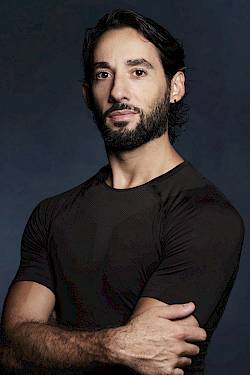
Esteban Berlanga,
Esteban Berlanga
Esteban Berlanga comes from Spain. After his training at the Royal Conservatory of Albacete and the Professional Dance Conservatory of Madrid, he danced at the English National Ballet from 2006 to 2013, where he was appointed principal dancer in 2012. Here he appeared as Prince Siegfried in Schwanensee by Derek Dean, the Prince in Kenneth MacMillan’s Dornröschen, Albrecht in Giselle by Mary Skeaping, the Nutcracker in the choreography by Wayne Eagling and Frédéric in L’Arlésienne by Roland Petit, among others. He also appeared in choreographies by Jiří Kylián and Maurice Béjart. He was nominated for the «Prix Benois de la Danse» for Faun(e) by David Dawson. He was principal dancer in the Compañia Nacional de Danza España from 2013-2018. There he performed as a soloist in choreographies by William Forsythe, Itzik Galili, Roland Petit, Aleix Mañé and Kenneth MacMillan. He has appeared with the English National Ballet, the Australian Ballet, the Nariko Kobayashi Ballet, and the Carmen Cortès Flamenco Company. He has been a member of Ballett Zürich since the 2018/19 season, where he has performed in Christian Spuck’s Winterreise and in the title role of Marco Goecke’s Nijinski.
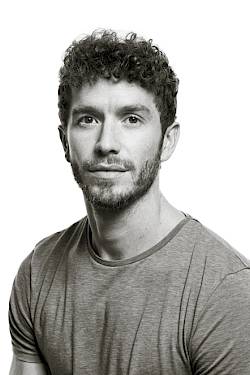
William Moore,
William Moore
William Moore is British and studied at the Royal Ballet School in London. He has won prizes at international ballet competitions. He has belonged to the Stuttgart Ballet since 2005 and was appointed as principal dancer there in 2010. Important roles were Siegfried in Schwanensee, Lensky in Onegin and Lucentio in Der Widerspenstigen Zähmung (all by John Cranko), Armand in Neumeier’s Kameliendame, Leonce in Christian Spuck’s Leonce und Lena, the title role in Marco Goecke’s Orlando, Albrecht in Giselle by Anderson/Savina, Colas in Ashton’s La fille mal gardée. In 2012 William Moore was awarded the German Theater Prize «Der Faust». Since the 2012/13 season he has been first soloist with Ballett Zürich. Important roles include Romeo in Spuck’s Romeo und Julia, Vronsky in Anna Karenina, the Nutcracker in Spuck’s Nussknacker und Mausekönig, Mephisto in Faust by Edward Clug, Petruschka in the choreography by Marco Goecke, and Diaghilev in Goecke’s Nijinski. He has also appeared in pieces by Wayne McGregor, Sol León/Paul Lightfoot, Douglas Lee, and Jiří Kylián. In 2018 he received the «Tanzpreis der Freunde des Balletts Zürich».
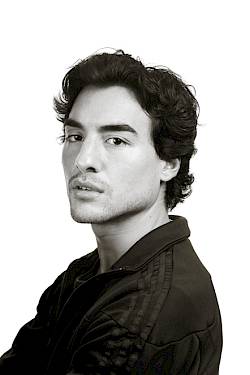
Kevin Pouzou,
Kevin Pouzou
Kevin Pouzou is French. He studied at the École de Danse de l’Opéra de Paris and at the Conservatoire National Supérieur de Musique et de Danse in Paris. In 2007 he became a member of the Staatsballett Berlin, where he was appointed principal dancer in 2015. He has performed as Benno in Patrice Bart’s Schwanensee, as Paris in John Cranko’s Romeo und Julia, as well as in choreographies by George Balanchine, Nacho Duato, Stanton Welch, Angelin Preljocaj, Alexei Ratmansky, Ohad Nahrin, Vladimir Malakhov, and Jiří Kylián. He has been a member of Ballett Zürich since the 2017/18 season, where he has appeared as Prince Siegfried in Alexei Ratmansky’s Schwanensee, Diaghilev in Marco Goecke’s Nijinski, and Albrecht in Patrice Bart’s Giselle.
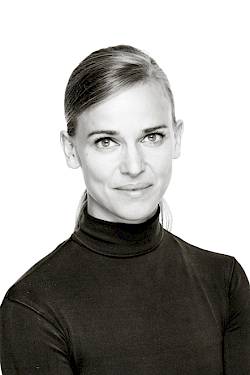
Katja Wünsche,
Katja Wünsche
Katja Wünsche comes from Dresden and was trained at the Staatliche Ballettschule Berlin. She has won prizes at numerous ballet competitions. From 1999 to 2012 she danced in the Stuttgart Ballet, including as a principal dance from 2006. She danced leading roles in choreographies by John Cranko (Romeo und Julia, Der Widerspenstigen Zähmung, Onegin), John Neumeier (Endstation Sehnsucht, Die Kameliendame), Marcia Haydée (Dornröschen, La Sylphide, La fille mal gardée) and Christian Spuck (Lulu, Der Sandmann, Leonce und Lena, Das Fräulein von S.) and ballets by Forsythe, Kylián, León/Lightfoot and Goecke. In 2007 she was awarded the German Dance Prize Future (for promising young artists) and the German Theater Prize Der Faust. Katja Wünsche has been a first soloist with Ballett Zürich since the 2012/13 season. She has been seen in Zurich as Julia in Spuck’s Romeo und Julia, Lena in Leonce und Lena, Marie in Woyzeck, Anna Karenina and Kitty in Anna Karenina and Clara in Der Sandmann. She has also performed in choreographies by Sol León/Paul Lightfoot, Douglas Lee, Martin Schläpfer, Wayne McGregor and Marco Goecke. In 2014 she was awarded the «Tanzpreis der Freunde des Balletts Zürich».
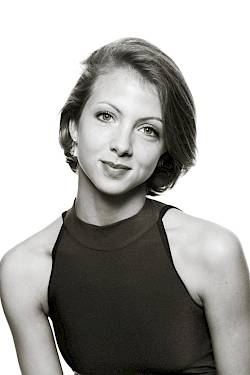
Michelle Willems,
Michelle Willems
Michelle Willems is French. She studied at the Bolshoi Ballet Academy and at the Atelier Rudra-Béjart in Lausanne. After two seasons with the Junior Ballett, she joined Ballett Zürich in the 2016/17 season. After solo roles in Giselle and Schwanensee, she danced Kitty in Christian Spuck’s Anna Karenina, Marie in Spuck’s Nussknacker und Mausekönig and Gretchen in Edward Clug’s Faust, and in Spuck’s Das Mädchen mit den Schwefelhölzern. She has also appeared in choreographies by William Forsythe, Jiří Kylián, Marco Goecke, Crystal Pite, George Balanchine, Ohad Naharin, Douglas Lee, and Filipe Portugal She was awarded the «Tanzpreis der Freunde des Balletts Zürich» in 2018.
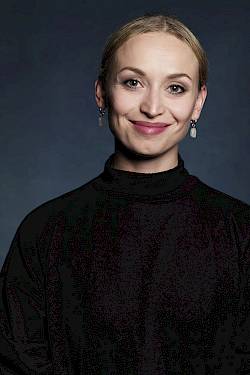
Irmina Kopaczynska,
Irmina Kopaczynska
Irmina Kopaczynska was born in Poland. She studied at the Polish National Ballet School Poznan. She won several prizes in the Polish National Ballet Competition. She also took part in the «Premio Roma» and the «Prix de Lausanne». After two seasons with the Junior Ballett, she became a member of Ballett Zürich starting with the 2011/12 season. She danced the Silver Fairy in Mats Ek’s Dornröschen, Betsy in Christian Spuck’s Anna Karenina, and the Nursemaid in Spuck’s Romeo und Julia. She has also appeared in choreographies by William Forsythe (In the middle, New Sleep), Hans van Manen (Kammerballett), Jiří Kylián (Gods and Dogs, Bella Figura), Iacopo Godani, Edward Clug, Marco Goecke (including the Mother in Nijinski), Douglas Lee, and Crystal Pite.
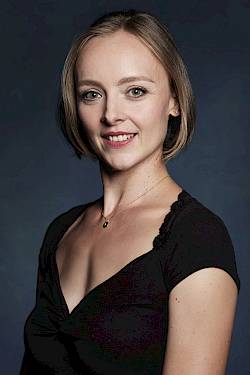
Mélanie Borel,
Mélanie Borel
Mélanie Borel comes from France. She studied at the École Nationale Supérieure de Danse in Marseille and at the École de Danse de l’Opéra de Paris. Engagements have taken her to the Ballet de l’Opéra National de Bordeaux and, from 2005 to 2008, to the Peter Schaufuss Ballet in Denmark. She has been a member of Ballett Zürich since the 2008/09 season and has performed as a soloist in choreographies by Twyla Tharp, Heinz Spoerli, and Mats Ek. She was the Haushofmeister in Spuck’s Leonce und Lena and danced the «Cholerisch» variation in Balanchine’s The Four Temperaments. In addition, she has appeared in choreographies by Marco Goecke, Douglas Lee, Jiří Kylián, Wayne McGregor, Martin Schläpfer, Hans van Manen, Edward Clug and Crystal Pite.
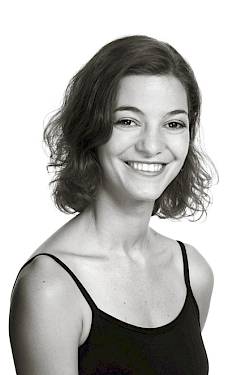
Mélissa Ligurgo,
Mélissa Ligurgo
Mélissa Ligurgo comes from Belgium and studied at the Royal Ballet School in Antwerp. She danced in John Cranko’s Onegin (Tatiana), as well as in ballets by Forsythe, Kylián, Dawson, and Robbins, at the Royal Ballet of Flanders. She appeared in Preljocaj’s Romeo und Julia (Julia) at the Ballett Basel in the 2011/12 season. She has been a member of Ballett Zürich since the 2012/13 season, where has danced Lena in Leonce und Lena by Christian Spuck and Frau Mauserinks in Nussknacker und Mausekönig. She has also appeared in choreographies by Wayne McGregor and Douglas Lee. As part of the «Junge Choreografen» series she presented Mind Games and Klastos together with Giulia Tonelli as well as Individuo.
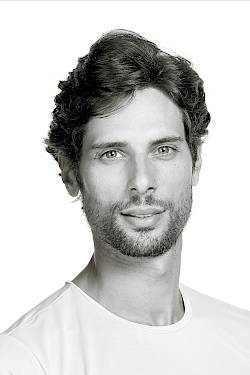
Yannick Bittencourt,
Yannick Bittencourt
Yannick Bittencourt is Swiss. He was born in Bern and he studied at the AS Ballettschule in Switzerland, the Opéra de Paris Ballet School and the Royal Ballet School in London. After an engagement with the American Ballet Theatre Studio Company in New York, he became a member of the Paris Opera Ballet in 2007, where he was appointed demi-soloist (Sujet) in 2010. In Paris he has danced Prince Siegfried in Nureyev's Swan Lake, James in Pierre Lacotte's La Sylphide, Daphnis in Benjamin Millepieds Daphnis et Chloé, and Benvolio and Paris in Nureyev's Romeo and Juliet. He has also appeared in key roles in ballets by William Forsythe, John Neumeier, José Martinez, Serge Lifar, Wayne McGregor, and George Balanchine. He has performed in galas at the National Theatre Tokyo and the Moscow Bolshoi Theatre (Benois de la Danse Ceremony Gala). This is his first season as a member of the Ballett Zürich.
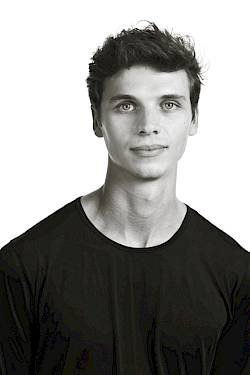
Mark Geilings,
Mark Geilings
Mark Geilings comes from Australia, where he was trained at the Australian Ballet School. He danced with the Leipzig Ballet from 2012-2015, where he performed in choreographies by Uwe Scholz, Mario Schröder (the title role in Otello), Meryl Tankard (Cinderella), Ohad Naharin, and Cayetano Soto. He was a member of Gauthier Dance in Stuttgart for the 2015/16 season, where he performed in Marco Goecke’s Nijinsky. He has been a member of Ballett Zürich since the 2016/17 season, where he has appeared in Petruschka by Marco Goecke, Kammerballett by Hans van Manen, Gods and Dogs by Jiří Kylián, Lady with a Fan by Douglas Lee, and as Mercutio in Spuck’s Romeo und Julia, among others.
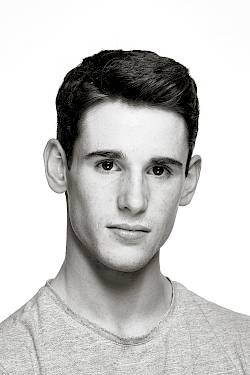
Gary Solan,
Gary Solan
Gary Solan is from Ireland. He graduated from the Royal Ballet School in London in 2018. He has performed with the Royal Ballet in Schwanensee, Manon, Der Nussknacker, Sylvia, Alice im Wunderland and Giselle. This is his second season as a member of the Junior Ballet and he has appeared in choreographies by Goyo Montero, Louis Stiens and Filipe Portugal.
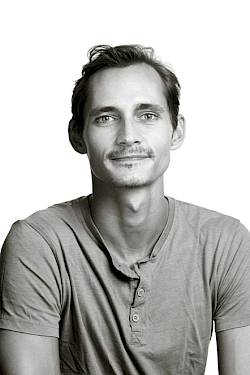
Dominik White Slavkovský,
Dominik White Slavkovský
Dominik White Slavkovský is Slovakian. Trained at the Bratislava Dance Conservatory, he danced for five years in the Ballet of the Slovak National Theater in Bratislava, most recently as a semi-soloist. He has been a member of Ballett Zürich since the 2014/15 season. In choreographies by Christian Spuck he performed the title role of "Woyzeck", as Drosselmeier in "Nutcracker and Mouse King", Coppelius in "The Sandman", Paris in "Romeo and Juliet" and as Death in Edward Clug's "Peer Gynt". He has also danced in choreographies by George Balanchine, Uwe Scholz, Alexei Ratmansky, Jiří Kylián, William Forsythe, Crystal Pite, Hans van Manen, Nacho Duato, Marco Goecke, James Kudelka, Vladimir Malakhov and many others. In the series "Young Choreographers" he showed his pieces "How to save the world", "Conspiracy" and "Boyband"
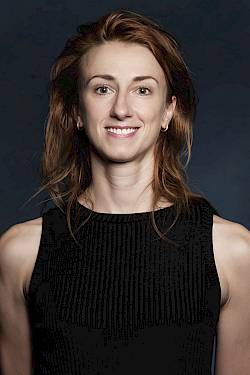
Elena Vostrotina,
Elena Vostrotina
Elena Vostrotina comes from St. Petersburg. She received her ballet education at the Vaganova Academy of Russian Ballet. In 2003 she became a member of the Mariinsky Ballet. There she danced among others Odette/Odile in Schwanensee (Petipa/Ivanov), Myrtha in Giselle (Coralli/Perrot), Queen of the Dryads in Don Quixote (Gorsky) and in Approximate Sonata (Forsythe). In 2006 she was engaged by Aaron S. Watkin at the Semperoper Ballett Dresden. Here she was appointed principal dancer and danced a wide repertoire of classical, neoclassical and modern ballets. She has collaborated with renowned choreographers and performed at the Stanislavsky and Nemirovich-Danchenko Moscow Academic Music Theater in Moscow, at the State Theater Novosibirsk, at the gala «Roberto Bolle and Friends», and at the Ballets Bubeníček. Elena Vostrotina has been a first soloist at Ballett Zürich since the 2017/18 season, where season she has appeared as Odette/Odile in Ratmansky’s Schwanensee reconstruction, as the nursemaid in Christian Spuck’s Romeo und Julia, Myrtha in Patrice Bart’s Giselle as well as in Christian Spuck’s Nussknacker und Mausekönig, Winterreise and Nocturne.
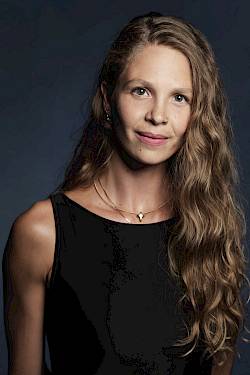
Francesca Dell'Aria,
Francesca Dell'Aria
Francesca Dell’Aria comes from Italy. She received her training at the Elmhurst School and the Birmingham Royal Ballet. After an engagement with the Slovak National Ballet, she was a member of the Bayerisches Staatsballett from 2010 to 2014. She has belonged to Ballett Zürich since the 2014/15 season and has appeared in choreographies by William Forsythe (New Sleep, workwithinwork, In the middle, The Second Detail), Jiří Kylián (Gods and Dogs, Falling Angels), George Balanchine, Hans van Manen (Kammerballett) Jacopo Godani, Douglas Lee, Edward Clug, Marco Goecke (Nijinski), and Crystal Pite. She also appeared in the title role of Christian Spuck’s Anna Karenina and as Myrtha in Patrice Bart’s Giselle. She was awarded with the «Tanzpreis der Freunde des Balletts Zürich» in 2019.
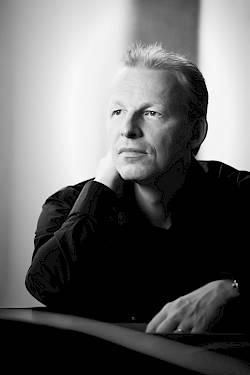
Adrian Oetiker,
Adrian Oetiker
Der Schweizer Pianist Adrian Oetiker verfolgt seit vielen Jahren eine weltweite Karriere. Er studierte er in der Meisterklasse von Homero Francesch an der Zürcher Hochschule der Künste und bei Bella Davidovich an der Juilliard School in New York. Auch Lazar Berman zählte zu seinen Lehrern. 1995 gewann er den ARD-Wettbewerb in München. Konzerte in Europa, Amerika und Australien führten ihn mit vielen Orchestern zusammen, darunter das Tonhalle-Orchester Zürich, das Symphonie-Orchester des Bayerischen Rundfunks, die Staatskapelle Dresden, das Irish National Symphony Orchestra und das Melbourne Symphony Orchestra. Bei wiederholten Einladungen nach Australien trat er mit den meisten Orchestern des Kontinents auf. Mit dem Orchestre Symphonique de Mulhouse unter Daniel Klajner spielte er von 2006 bis 2008 alle Klavierkonzerte von Béla Bartók. Rezitals und Kammermusik-Programme spielte er u.a. in der Berliner Philharmonie, im Gewandhaus Leipzig, im Festspielhaus Salzburg, im KKL und im Teatro La Fenice in Venedig. Er musiziert regelmässig im Klavierduo Paola & Adrian Oetiker und ist Pianist im Feininger Trio der Berliner Philharmoniker. Mehrere Ballettproduktionen am Opernhaus Zürich, an der Semperoper Dresden, an der Bayerischen Staatsoper und an der Deutschen Oper Berlin, u.a. mit Christian Spuck, runden seine vielfältigen Tätigkeiten ab. Adrian Oetiker ist Künstlerischer Leiter der Internationalen Sommerakademie Ettal und war von 1996 bis 2021 Professor für Klavier an der Hochschule für Musik Basel. 2011 wurde er als Professor an die Hochschule für Musik und Theater in München berufen.


